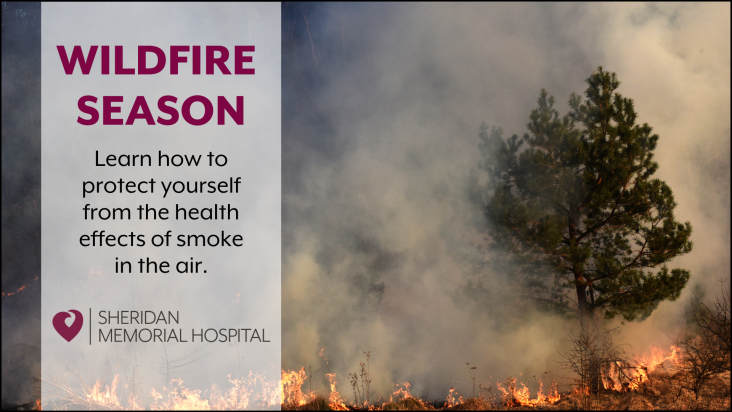SHERIDAN – Living in the West, most have become accustomed to the haze that fills the skies in the summer months. Over the last week, though, as people awoke to find ash on vehicles in Sheridan and neighboring communities, the conversations around wildfires and the smoke they produce have generated questions and concerns regarding the health implications.
You may first recognize the smoke in the air using your sense of smell or sight, but a more accurate way to check the air quality in your area is to look it up online. Most of the popular weather apps include an air quality report and websites like fire.airnow.gov allow you to check the air quality and see where the smoke is coming from and how far the smoke plumes stretch.
What you do with this information depends on several factors, including your personal risks and health history.
“While the smoke in the air can be an annoyance for all, those with chronic illnesses, older adults and children are most at risk for serious health concerns due to smoke inhalation,” said Dr. Juli Ackerman, a physician with Sheridan Memorial Hospital’s Internal Medicine Clinic.
Wildfire smoke can exacerbate respiratory conditions such as asthma and chronic obstructive pulmonary disease. Inflammation caused by breathing smoke can also affect individuals with chronic conditions like diabetes, kidney disease or heart disease. Those with underlying or chronic health conditions should visit with their healthcare provider to make a plan for dealing with poor air quality, managing symptoms and ensuring their safety.
“Living in the West where wildfires are fairly common, it’s important to have a plan in place for how you will keep yourself safe from potential impacts of wildfire smoke in our community,” Dr. Ackerman said. “It’s also important to note that even if the smoke seems to clear from the air, symptoms and health concerns arising from that smoke may linger or develop over several days, so it’s important to remain on guard throughout the fire season.”
Young children and older adults are particularly sensitive to smoke in the air. Children’s lungs are still developing, while older adults often have weakened immune systems – leaving both vulnerable to symptoms such as sinus irritation, shortness of breath, wheezing, headaches or coughing.
If air quality is poor, or if you have increased risk, limit your time outside as much as possible. In particular, keep activity levels like outdoor exercise to a minimum. If you do go outside, consider wearing a high-quality mask like an N95; surgical masks and wet bandanas or cloths are not very effective in keeping the smoke particles out of your airway. In addition, change your clothes when you get home to avoid bringing lingering smoke particles into your living space.
In your home, if possible, keep your windows and doors closed. Air purifiers can help filter out some of the particles from wildfire smoke. Air conditioners can also help, but ensure any window units have a tight seal around them, and if you utilize central air, consider switching the system to recirculate mode to avoid pulling in the smoky air from outside.
Contact your healthcare provider if you begin experiencing symptoms such as shortness of breath, trouble breathing or excessive coughing, and as always, call 9-1-1 or go to an emergency department if you are experiencing chest pain or if you think you are having a heart attack or stroke.
Talk to your primary care provider about your healthcare concerns. If you don’t have one, check out Sheridan Memorial Hospital’s Primary Care practice or call or text 307.675.2690.

